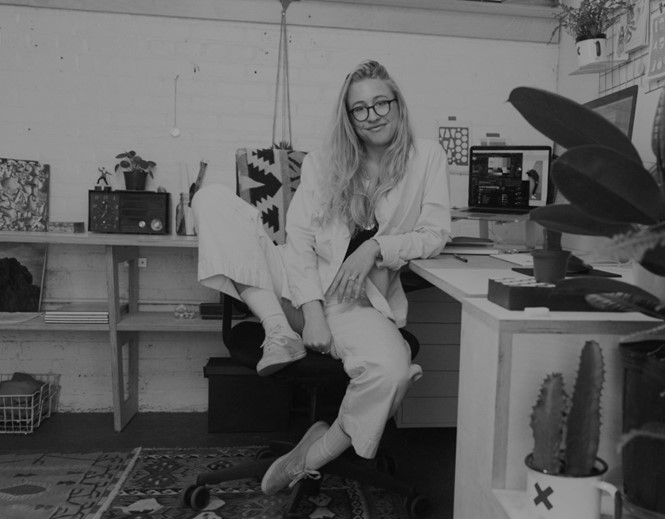Five minutes with Lake Buckley

Transform magazine speaks with creative director of creative agency SpecialGuest Lake Buckley about the opportunities and challenges young people face in the design space, and what it means to be a young woman making her way up in the industry
How did you make your way to become the creative director of SpecialGuest? What advice would you give to young students wanting to break into the design and branding industry?
The best advice I’ve gotten seems very simple. It is: “Make the work you are interested in making, and focus on the work itself, not the rewards (ie. money, awards, etc.).” Initially, the work you are interested in doing might not always be aligned with making money, so make time for personal projects and do work that captures your perspective even if you are not making money on those projects. Eventually, people will pay you to do that same work. This might mean that you’re working several jobs at once, some for income and some for creative fulfilment, but eventually these things will align, if they don’t already from the get go.
The second thing I would recommend to young creatives is to find people that inspire you rather than companies. I found my way to SpecialGuest because I really admired the creative thinking of our Founder and Executive Creative Director Aaron Duffy.
Lastly, I’d say try to be clear with yourself about the skills you are interested in developing and how those things are helping you achieve long-term creative goals. Eventually, you will have to start saying no to certain types of work that don’t align with your goals, and knowing which skills you are seeking to develop will help you decide which work is best for you at the given time.
Is there enough young talent in the design space? What can young creatives bring to the table that the older generation does not?
The barrier to entry in design is very low. Anyone with a phone, a ripped version of Creative Cloud, or even a pencil can have a presence in the space. I think partially because of this, the space is relatively accessible, making it possible for young people to have a tangible presence. TikTok has been an amazing example of this recently. Such creative and smart work has been generated by a group of young people mostly without design-related degrees or education.
Design thrives on new perspectives and ways of making. Young creatives in the space are often celebrated for the creative risks they take. Furthermore, young designers bring a perspective to their work that is unique to their life experience. A younger generation can shine a light on the blindspots that an older generation might otherwise have missed.
The Covid-19 pandemic has rattled the job market, and young people will be the ones suffering the most from this recession. How do you think Covid-19 will affect the young workforce in the creative space? What can job-seekers do to keep striving for a place?
It’s a great question, and one I should be thinking about more. I recently read about how the Gig Economy is getting taken over by the ‘Hustle Economy’ or ‘Passion Economy’. This basically refers to the world of Patreon, Twitch, Etsy, Podia, OnlyFans, etc., where people can profit by channeling their skills and interests into a service or product. My guess is that this type of decentralized economy will keep growing, and that young people will make up the majority of this workforce. I guess this means that in some instances, we will see young job-seekers having to create their own jobs and invent creative ways to market themselves.
As a woman, have you encountered barriers making your way into the industry? How have you overcome that?
Working against people’s gendered assumptions that exist in both small and large ways is certainly exhausting and frustrating at times. A ‘small’ example of this (pre-COVID) is that just about every week someone at a creative event or work-related meeting would make the assumption that I was a producer. This is because the gender stereotype in this industry is that women are producers and men are directors. Having this stereotype reinforced on a weekly basis was -- and still is -- tiring.
Oftentimes, I will be the only woman in the room or only female creative on a project. Working against stereotypes and being in spaces where there isn’t leadership that looks like me can take a bit more energy at times. I will also note that I’ve been extremely lucky to find male allies in this space who put in the work to remain aware of gender dynamics and inequities. A shout-out to my boss Aaron for being one of these amazing people!
I don’t think gender inequality is something that you overcome (not until it doesn’t exist!). I think it’s something you learn to cope with and work against while striving to educate your community. The benefits to experiencing barriers due to gender is that it helps to cultivate empathy for other people and groups that experience inequity in various forms. I stay to stay grateful for this empathy as I work on understanding my own blindspots.
SpecialGuest operates on a non-traditional model embracing and partnering with freelance talent. What are the benefits of working with freelancers rather than those strictly in-house?
I love our freelancers! It’s like a big extended family. I would say there are benefits from a creative perspective as well as from a business perspective. From a creative perspective, it’s great to be able to work with people who best fit the demands of a particular job or client. From a business perspective, it works well to have a small nimble team that can grow or shrink as needed.












